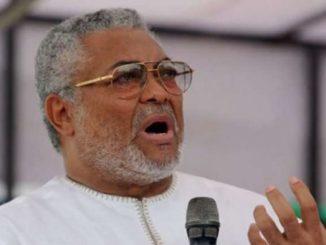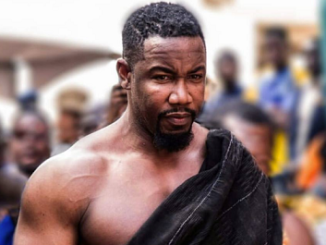Herbert Winful makes Africa proud

In 1972, when Herbert Winful entered the Massachusetts Institute of Technology (MIT) from St Augustine’s College (Cape Coast, Ghana), he was to find out that Kofi Annan and Isaiah Blankson (both alumni of Mfantsipim School, Cape Coast) were already enrolled in graduate programs there.
[Annan was to become the secretary-general of the United Nations, and Blankson was to advance as a key scientist with the National Aeronautics and Space Administration (NASA) with the mission to explore the planet Mars.]
Winful did not apply to MIT initially because he thought the school was for science nerds, and he wanted a broader education. So after the 6th form in Ghana, he enrolled at Lehigh University (Bethlehem, Pennsylvania). It happened that while at Lehigh he visited MIT and realised they offered more than just science and engineering and that he could even take courses in music. After a year at Lehigh, he shifted to MIT.
Early life
Winful grew up in Cape Coast where he attended Catholic Jubilee School for his primary and middle school education. He recalled how a headmaster, Robert Mensah, wanted to jump him from Class 3 into Class 6, skipping two grades. His mother was having none of that, thinking her son was far too young for that hurdle. In the end the two adults compromised, and he was made to skip one grade only into Class 5.
Another fond memory Winful had of his Jubilee School days was the privilege of being chosen to present flowers to the cosmonaut Valentina Tereshkova – the first woman in space – when she visited Ghana in January 1964. He was eleven years old then but was captivated by Yuri Gagarin’s voyage and the other pioneer cosmonauts and astronauts.
A voracious reader in the Cape Coast library at the time, he passed the common entrance examination and entered St. Augustine’s College for his secondary education. He was quite active there in extracurricular pursuits and played rhythm guitar in a pop band called Chelsea 5. Additionally, not only did he play organ in church, he was the projectionist for movie nights, took part of the quiz team that won a national championship, was president of the Literary Club, and a house prefect of Kelly House.
The making of a genius
He finished the 5th form with “ones” in all 8 subjects he offered for the GCE O-Level so people started calling him “Eight ones”. His classmate, Maurice Brunner, too got 8 ones. Apparently, this achievement was unprecedented and so the West African Examinations Council (WAEC) sent investigators to St. Augustine’s to make sure there was nothing fishy going on! [Brunner went on to become an engineering professor, in Switzerland.]
Winful’s mother was the headmistress of St. Michael’s School in Cape Coast. His father, a civil engineer, worked on the Akosombo Dam during its construction and rose to become executive secretary of the Volta River Authority (VRA). He took him a few times to the construction site where Winful marvelled at the enormity of the penstocks that brought water from the dammed river to turn the turbines that generated electricity. That helped fuel his interest in engineering.
He also had an uncle, J. Dawson Otoo, a principal of Apowa Teachers Training College. He gave young Winful a book on 1,000 experiments you could do at home and that helped nurture an interest in science. In all, he loved to build things and conduct experiments at home and knew from an early age he was destined to be an engineer and a scientist.
His other passion in music was encouraged by his mother and uncles Charles and Richard Graves, great musicians both. How thankful it was to master equally engineering and music, and even bring them together on occasion!
The 2020 Honoree
The Institute of Electrical and Electronics Engineers (IEEE) Photonics Society Quantum Electronics Award is given to honor an individual (or groups) for outstanding technical contributions to quantum electronics, either in fundamentals or applications, or both. The Award may be for a single contribution or for a distinguished series of contributions over a long period of time. The Award consists of an honorarium and a medal. The presentation is made at the IEEE Photonics Conference.
In 2020, Winful won the award for his pioneering work the field of nonlinear optical periodic structures and for foundational contributions to nonlinear dynamics of semiconductor laser arrays.
Recognised for his enormous talents, Winful is the Joseph E. and Anne P. Rowe Professor of Electrical Engineering; Arthur F. Thurnau Professor of Electrical Engineering and Computer Science; and a Professor of Physics at the University of Michigan. He earned a BS degree in electrical engineering from MIT in 1975 and a PhD from the University of Southern California in 1981. He then spent six years conducting research in fiber optics and semiconductor laser physics as a principal member of Technical Staff at GTE Laboratories in Waltham, Massachusetts. Winful joined the University of Michigan in 1987 and was promoted to full professor four years later.
Winful’s stellar awards
His many contributions to photonics and quantum electronics include pioneering work on nonlinear optical periodic structures; the nonlinear dynamics of coherently coupled laser arrays; the physics of quantum tunneling time; polarization instabilities and distributed-feedback fiber Raman lasers. He has published over 130 journal articles and supervised the research of PhD students. For ten years he ran an NSF Research Experiences for Undergraduates site at the Center for Ultrafast Optical Science (CUOS).
Winful is a Life Fellow of the Institute of Electrical and Electronics Engineers (IEEE); a Fellow of the American Physical Society, the Optical Society of America, and the National Society of Black Physicists. His many awards include the EECS Outstanding Achievement Award; the College of Engineering Teaching Excellence and Service Excellence Awards; The Provost’s Teaching Innovation Prize; the Amoco/University of Michigan Teaching Excellence Award; the State of Michigan Teaching Excellence Award, and the Raymond J. and Monica E. Schultz Outreach and Diversity Award. He has been twice voted Professor of the Year in Electrical Engineering and Computer Science; and named the Tau Beta Pi Outstanding Professor in the College of Engineering.
Professor Gérard Mourou, Winful’s previous colleague, was a co-winner of the 2018 Nobel Prize in Physics for the invention of a technique known as Chirped Pulse Amplification which makes possible the most powerful laser pulses known to mankind. To celebrate the honour, Winful performed a composition of his in front of a couple of hundred guests.



